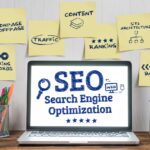Introduction to AI Tools for Business
Artificial Intelligence (AI) tools have transformed the way businesses operate, empowering them to make data-driven decisions efficiently and effectively. These tools utilize advanced algorithms and machine learning techniques to analyze large datasets, extract valuable insights, and automate various processes. In the constantly evolving digital landscape, leveraging AI tools can give businesses a competitive edge by enhancing productivity, improving customer experiences, and enabling innovation.
When it comes to integrating AI into business operations, choosing the right tools is crucial. The top AI tools for business encompass a wide range of capabilities, from natural language processing and predictive analytics to image recognition and sentiment analysis. Understanding the diverse functionalities of these tools can help businesses select the most suitable ones to address their specific needs and goals.
Read Also: SEO and Social Media Marketing: A Winning Combination for Your Business
In this article, ABC-Media.net explores the top 10 AI tools for business that are making waves in the industry. From cutting-edge chatbots and virtual assistants to powerful data analytics platforms and personalized recommendation engines, these tools offer a glimpse into the endless possibilities AI technology brings to the business world. By going into the unique features and benefits of each tool, businesses can gain valuable insights into how they can leverage AI to drive growth, streamline operations, and stay ahead of the competition.

Top Tools In The Business industry:
1. AI-powered Customer Relationship Management (CRM) Tools
AI-powered Customer Relationship Management (CRM) tools offer businesses the ability to streamline their customer interactions and enhance overall customer satisfaction. These tools utilize AI algorithms to analyze customer data, predict customer behavior, and personalize marketing strategies. Some key features of AI-powered CRM tools include:
- Automated Lead Scoring: AI algorithms can help businesses prioritize leads based on their likelihood to convert, enabling sales teams to focus on high-potential prospects.
- Predictive Analytics: By analyzing customer data and behavior patterns, AI-powered CRM tools can forecast customer needs and preferences, allowing businesses to tailor their offerings accordingly.
- Personalized Marketing: AI algorithms can segment customers based on their preferences and past interactions, enabling businesses to deliver targeted marketing campaigns that resonate with individual customers.
- Chatbots: AI-powered chatbots can provide instant customer support, answer frequently asked questions, and guide customers through the sales process, improving overall customer experience.
- Workflow Automation: AI-powered CRM tools can automate repetitive tasks such as data entry, follow-up emails, and appointment scheduling, freeing up time for sales and customer service teams to focus on high-value activities.
AI-powered CRM tools are revolutionizing the way businesses manage customer relationships, providing insights that enable more personalized interactions and ultimately driving customer loyalty and retention. Integrating AI into CRM systems can give businesses a competitive edge in today’s fast-paced and data-driven market environment.
2. Automated Data Analytics Platforms
Automated data analytics platforms are essential tools for businesses looking to efficiently analyze and derive insights from large volumes of data. These platforms utilize artificial intelligence algorithms to automate the process of data analysis, allowing companies to make faster and more informed decisions. Here are some top AI tools in this category:
- Tableau: Tableau is a powerful data visualization tool that leverages AI for automated data analysis, making it easy for users to create interactive dashboards and reports.
- IBM Watson Analytics: IBM Watson Analytics is an advanced analytics platform that uses AI to uncover patterns and trends in data, enabling businesses to make data-driven decisions.
- Qlik: Qlik Sense is a self-service data analytics tool that employs AI to provide automated insights and suggestions for data visualization.
- Microsoft Power BI: Power BI is a business analytics tool that uses AI to automate data preparation, analysis, and visualization, helping organizations turn data into actionable insights.
- Sisense: Sisense is a BI software that uses AI technology for automated data preparation, analysis, and visualization, empowering users to easily explore and understand complex data sets.
These automated data analytics platforms help businesses streamline their data analysis processes, improve decision-making, and gain valuable insights from their data with the help of artificial intelligence.
3. Virtual Assistants for Streamlined Operations
Virtual assistants are AI-powered tools that can significantly improve operational efficiency by handling routine tasks, scheduling, and communication with stakeholders. Here are the top virtual assistants for streamlined operations:
- 1. Google Assistant: Integrates with G Suite, helps schedule meetings, set reminders, and provides hands-free assistance.
- 2. Siri: Apple’s virtual assistant can send messages, set alarms, and provide personalized suggestions to streamline daily tasks.
- 3. Alexa: Amazon’s virtual assistant assists in managing to-do lists, setting reminders, and controlling smart home devices for seamless operations.
- 4. Microsoft Cortana: Integrates with Windows OS, Office 365, and other Microsoft services to enhance productivity through voice commands and task management.
- 5. Amelia: A cognitive virtual agent by IPSoft that streamlines IT operations, customer service, and back-office tasks through automation and natural language processing.
- 6. Ada: An AI-powered chatbot that enhances customer support operations by providing instant responses and guiding users through self-service options.
- 7. UiPath: Offers robotic process automation (RPA) solutions to streamline repetitive tasks across various departments, improving operational efficiency.
- 8. WorkFusion: Combines RPA and AI capabilities to automate complex operational processes, such as data management and customer communications.
- 9. Haptik: A conversational AI platform that streamlines customer interactions, order processing, and service inquiries through automated conversations.
- 10. Intercom: Enhances customer communication operations by providing AI-powered chatbots for instant responses and automated lead qualification.
Virtual assistants play a crucial role in streamlining operations by automating tasks, enhancing productivity, and improving customer interactions. Incorporating these AI tools can optimize business processes and drive overall efficiency.
Read Also: SEO and Social Media Marketing: A Winning Combination for Your Business
4. AI-powered Chatbots for Enhanced Customer Support
Chatbots powered by artificial intelligence (AI) have revolutionized customer support for businesses. These intelligent virtual assistants are capable of interacting with customers in real-time, providing instant responses to queries and issues. Here are some top AI tools for incorporating chatbots into your customer support strategy:
- IBM Watson Assistant: IBM’s AI-powered chatbot allows businesses to create customized virtual agents that can engage with customers across multiple channels.
- Chatfuel: This user-friendly platform enables businesses to build chatbots for Facebook Messenger, offering personalized interactions and automated responses.
- LivePerson: LivePerson’s chat bots leverage AI to provide personalized recommendations and support to customers, enhancing their overall experience.
- Zendesk Chat: Zendesk Chat’s AI chatbots can handle routine customer inquiries, freeing up human agents to focus on more complex issues that require human intervention.
- ManyChat: ManyChat specializes in chatbots for social media platforms like Facebook, allowing businesses to automate conversations and nurture leads effectively.
By utilizing AI-powered chatbots, businesses can streamline their customer support processes, reduce response times, and improve overall customer satisfaction. These tools enable businesses to provide round-the-clock support, personalize interactions, and handle multiple customer queries simultaneously, leading to enhanced customer engagement and loyalty. AI chatbots are a valuable asset for businesses looking to scale their customer support efforts efficiently and effectively.

5. Machine Learning Algorithms for Predictive Analytics
Machine Learning Algorithms play a crucial role in predictive analytics, enabling businesses to make data-driven decisions. Here are some key algorithms used for predictive analytics:
- Linear Regression: A simple algorithm that models the relationship between one dependent variable and one or more independent variables by fitting a linear equation.
- Logistic Regression: Used for binary classification problems, logistic regression estimates the likelihood of a certain event occurring.
- Decision Trees: Decision trees break down a dataset into smaller subsets based on different conditions, assisting in the decision-making process.
- Random Forest: An ensemble learning algorithm that builds multiple decision trees and merges them together to get a more accurate and stable prediction.
- Support Vector Machines (SVM): SVM is effective for classification tasks by finding the hyperplane that best separates the classes in a high-dimensional space.
- K-Nearest Neighbors (K-NN): K-NN makes predictions by calculating the similarity between the input data point and its k-nearest neighbors.
- Naive Bayes: This algorithm is based on Bayes’ theorem and is commonly used for text classification and spam filtering.
- Neural Networks: An artificial neural network that mimics the human brain’s structure and function to process complex patterns and solve intricate problems.
- Gradient Boosting Machines: GBM is an ensemble learning algorithm that builds trees sequentially, with each tree learning from the errors of its predecessors.
- Clustering Algorithms: These algorithms group similar data points together, identifying patterns in the absence of predefined labels.
These machine learning algorithms are powerful tools for businesses seeking to leverage predictive analytics for forecasting, risk management, customer segmentation, and many more data-driven decisions.
6. AI-driven Marketing Automation Tools
AI-driven marketing automation tools have revolutionized the way businesses engage with their customers. By utilizing artificial intelligence, these tools can analyze customer data, predict behavior, and create personalized marketing campaigns at scale. Here are some top AI tools for business in this category:
- HubSpot: HubSpot’s marketing automation software uses AI to help businesses attract, engage, and delight customers. It offers features like email marketing, lead management, and analytics to optimize marketing efforts.
- Salesforce Einstein: Salesforce’s AI platform, Einstein, provides businesses with AI-powered insights to personalize customer experiences and drive marketing campaigns effectively.
- Adobe Campaign: Adobe’s AI-driven marketing automation tool, Adobe Campaign, allows businesses to design and automate personalized campaigns across multiple channels to reach their target audience effectively.
- Mailchimp: Mailchimp’s marketing platform utilizes AI to analyze customer behavior and preferences, enabling businesses to create targeted email campaigns that resonate with their audience.
- Oracle Eloqua: Oracle Eloqua is a marketing automation tool that uses AI to enhance lead generation, campaign management, and analytics to optimize marketing strategies and drive ROI.
AI-driven marketing automation tools empower businesses to deliver targeted and personalized marketing campaigns, ultimately driving engagement and conversion rates. By leveraging AI technology, businesses can streamline their marketing processes, gain valuable insights into customer behavior, and achieve tangible results in their marketing efforts.
7. Natural Language Processing (NLP) for Improved Communication

- Natural Language Processing (NLP) is an essential AI tool that businesses utilize for improved communication.
- NLP algorithms enable machines to understand, interpret, and generate human language.
- By analyzing text and speech data, NLP enhances interactions between businesses and customers.
- Sentiment analysis, a key NLP application, helps businesses gauge customer feedback and emotions.
- Text classification and named entity recognition are other NLP functionalities that streamline communication processes.
- NLP enables chatbots to provide quick and accurate responses to customer queries.
- Language translation services powered by NLP facilitate global communication for businesses.
- NLP can assist in summarizing and extracting key information from large volumes of text data.
- Implementing NLP tools enhances efficiency in customer support, marketing strategies, and overall business communication.
- With the advancement of NLP technology, businesses can personalize customer interactions and tailor content to specific audiences.
Utilizing NLP in business operations can lead to enhanced communication, improved customer satisfaction, and streamlined processes.
8. AI-powered Supply Chain Management Solutions
AI-powered supply chain management solutions are revolutionizing the way businesses manage their logistics and operations. These tools leverage artificial intelligence to optimize inventory management, streamline distribution processes, and enhance overall efficiency. Some key AI-powered supply chain management solutions include:
- Demand Forecasting: AI algorithms analyze historical data and market trends to predict future demand accurately. This helps companies optimize inventory levels and avoid stock outs or overstock situations.
- Inventory Optimization: By using machine learning algorithms, AI-powered solutions can help businesses optimize their inventory levels based on factors such as demand fluctuations, lead times, and seasonality.
- Route Optimization: AI algorithms can analyze various factors like traffic conditions, weather forecasts, and delivery schedules to optimize delivery routes for maximum efficiency and cost-effectiveness.
- Supply Chain Visibility: AI tools provide real-time visibility into the entire supply chain, allowing businesses to track shipments, monitor inventory levels, and identify potential bottlenecks proactively.
- Vendor Management: AI-powered solutions can analyze vendor performance data to identify the best suppliers based on factors like reliability, quality, and cost-effectiveness.
By harnessing the power of AI in supply chain management, businesses can reduce costs, improve customer satisfaction, and gain a competitive edge in today’s fast-paced market.AI-powered supply chain management solutions are transforming the way businesses operate by optimizing processes and enhancing decision-making capabilities.
9. AI-driven Financial Analysis Tools
AI-driven financial analysis tools have revolutionized the way businesses handle their financial data and make strategic decisions. These tools leverage artificial intelligence algorithms to analyze large datasets quickly and accurately, providing valuable insights into a company’s financial health and performance. Some key AI tools for financial analysis include:
- Automated Data Analysis: AI tools can process vast amounts of financial data in real-time, identifying trends, anomalies, and opportunities that may go unnoticed by human analysts.
- Predictive Analytics: By using historical financial data and machine learning algorithms, AI can forecast future trends, risks, and outcomes, enabling businesses to make informed decisions and mitigate potential financial risks.
- Risk Management: AI tools can assess financial risks more effectively by evaluating various factors and scenarios, helping organizations proactively manage risks and improve overall financial stability.
- Fraud Detection: AI-powered tools can detect suspicious activities and patterns in financial transactions, reducing the risk of fraud and enhancing security measures within financial systems.
- Portfolio Management: AI tools can optimize investment portfolios by analyzing market trends, predicting asset performance, and recommending strategic investment decisions to maximize returns.
- Financial Planning: AI tools assist in creating accurate financial forecasts, budgeting, and scenario planning, providing businesses with a roadmap for financial success and growth.
These AI-driven financial analysis tools empower businesses to make smarter financial decisions, minimize risks, and capitalize on opportunities in an ever-changing market landscape. By harnessing the power of AI, organizations can gain a competitive edge and drive sustainable growth in the financial domain.

10. Integrating AI Tools into Business Operations
Artificial intelligence tools play a pivotal role in enhancing business operations across various industries. By integrating AI tools effectively, organizations can streamline processes, boost efficiency, and drive innovation. Here are key points to consider when integrating AI tools into business operations:
- Assess Business Needs: Before implementing AI tools, it’s essential to assess the specific needs and goals of the business. Understand which areas of operations can benefit most from AI integration.
- Selecting the Right Tools: Choose AI tools that align with the business objectives and requirements. Consider factors such as scalability, compatibility with existing systems, and ease of integration.
- Data Integration: Ensure seamless integration of data sources to enable AI tools to analyze information effectively. Clean, organize, and structure data to derive meaningful insights.
- Employee Training: Provide adequate training to employees on how to utilize AI tools effectively. Encourage upskilling to maximize the benefits of AI integration.
- Monitoring and Evaluation: Continuously monitor the performance of AI tools in business operations. Evaluate the impact on key performance indicators and make necessary adjustments.
- Compliance and Security: Prioritize compliance with regulations and data security when integrating AI tools. Implement measures to protect sensitive information and ensure ethical use of AI technology.
- Cross-Functional Collaboration: Foster collaboration between different departments to leverage AI tools across the organization. Encourage sharing insights and best practices for optimal outcomes.
Integrating AI tools into business operations requires a strategic approach focused on maximizing the potential of technology to drive growth and success. By following these guidelines, businesses can harness the power of AI tools to stay competitive in an increasingly digital world.
Use AI tool like blogseo Its an AI writer designed specifically for content generation.
Conclusion
The business environment is evolving rapidly, and AI tools are playing a vital role in driving this transformation. Businesses can leverage on AI tools to streamline operations, enhance customer experiences, and gain valuable insights from data. ABC-Medianet’s top 10 AI tools offer a diverse range of capabilities, from natural language processing to predictive analytics.
Implementing AI tools in business processes leads to increased efficiency, cost savings, and competitive advantage. It is vital for organizations to stay up-to-date with the latest AI trends and tools to remain competitive in the market. As technology advances, AI tools will continue to revolutionize the way businesses operate and make decisions.
Businesses that embrace AI tools and incorporate them strategically are likely to see significant benefits in the long run. ABC-Medianet’s curated list of top 10 AI tools provides a valuable resource for businesses looking to integrate AI into their operations. In conclusion, the future of business lies in utilizing the power of AI tools to drive innovation, growth, and success.
Read Also: SEO and Social Media Marketing: A Winning Combination for Your Business
How Social Marketing Companies Can Boost Your Business In 2024.
Enhance Your Facebook Advertising for Small Business Success



